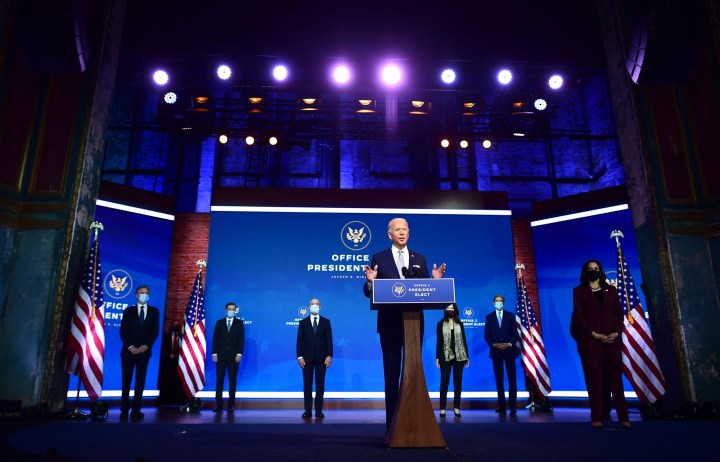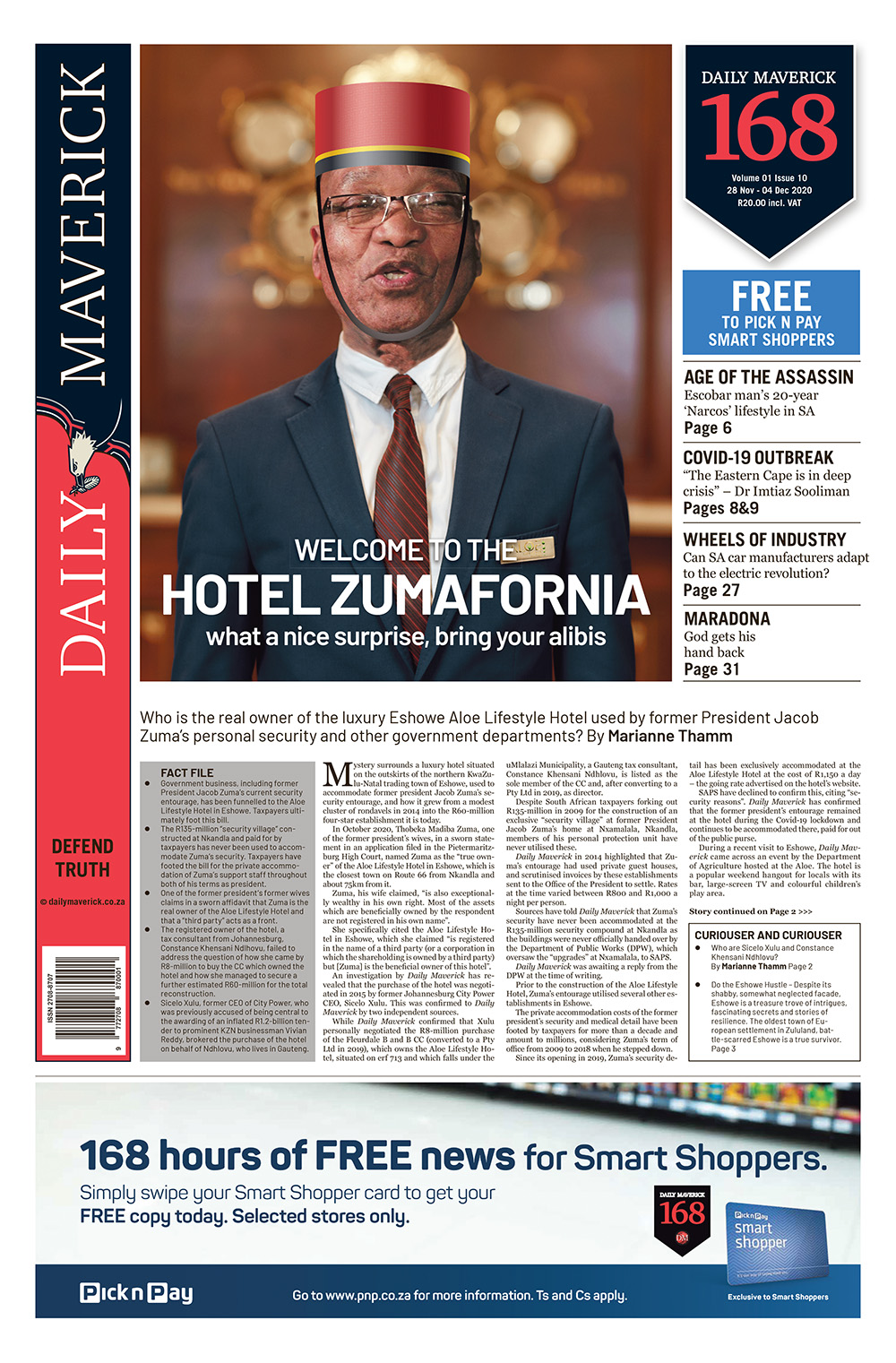DM168 World
WE, the lifeblood of democracy

As Trump shuffles off the stage, let us consider the lessons to be learnt from his rule.
First published in the Daily Maverick 168 weekly newspaper.
One could almost feel the global catharsis as Linda Thomas-Greenfield, Joe Biden’s pick for UN ambassador, announced: “America is back. Diplomacy is back. Multilateralism is back.”
Behind her stood John Kerry, Biden’s “climate czar”, and Secretary of State designate Tony Blinken, who described his immigrant roots with a sensitivity current incumbent Mike Pompeo could never muster.
The United States will always guard its own interests, there should be no mistake about that. Yet, hearing Blinken, Thomas-Greenfield and Kerry felt like a breath of fresh air after the past four years. The world cannot afford an erratic US. It matters who is in the Oval Office, given the US’s global power. The US under Trump has all but abandoned its “soft power” around the world and, by kowtowing to dictators, used its “hard power” in a haphazard way. China and Russia have sought to use even more of their “sharp power” than before. The implications of that for the world are clear.
It has been a torrid four years of tweetstorms and presidential rage. The word “Trumpian” is already in the global lexicon as a signifier of chaos, division and recklessness.
As US analyst David Axelrod has said, looking back on past presidencies seems almost like an exercise in sepia-toned memory-making, so far has the Trump presidency strayed from what would be deemed “normal” or conventional behaviour from the president.
Trump’s presidency has been venal and cruel, his way of governing a form of constitutional vandalism. It was for this reason that former president Barack Obama, usually preternaturally optimistic about America’s future, found himself delivering a very different speech at the Democratic National Convention in late August.
It was different for a number of reasons, not least of which was that it was taking place, virtually, in the midst of a global pandemic. But it was also different because here was an immediate past-president speaking in a place of heavy symbolism, the Museum of the American Revolution. There Obama found himself making the case not only for the constitution but for democracy itself.
The former is being trampled upon, and the latter is under threat.
Obama spoke plainly about the challenge ahead when he said: “So I am also asking you … to embrace your own responsibility as citizens — to make sure that the basic tenets of our democracy endure. Because that’s what’s at stake right now. Our democracy.”
To be sure, democratic degradation does not happen overnight. It takes time and it needs enablers of every kind. Watching the former New York mayor, Rudi Giuliani, sweat (and hair dye?) running down his face, manically lying about widespread voter fraud while at the same time quoting My Cousin Vinny, and listening to White House spokesperson Kayleigh McEnany spewing even more lies, one knows that the enablers come in all forms.
Trump, like all populists, simply exploited the complex grievances of his base — mostly white and male — which existed long before he came along. He then cloaked it all in the language not only of grievance but of God, and the result is a toxic mix. As writer Masha Gessen says in her new book, Surviving Autocracy, Trump cunningly used a Putinesque playbook, weaponising lies to create an alternative reality.
The distracting and destructive impact is clear, as Gessen concludes: “We can’t do politics if we can’t talk to one another. We can’t talk politics if we don’t inhabit a shared reality. We can’t have politics if we can’t agree on what we’re living through, because then we can’t discuss how we’re going to be living together tomorrow, which is what politics is.”
Gessen goes on to lay down the future challenge when, in an interview with Vox, she says: “But we also have some incredible damage done to political culture and political language. There will have to [be] real institutional repair and a total reinvention of how we think American democracy is represented institutionally.”
Gessen’s message is not only for the US, however. As we consider with dismay the Trump presidency and that even more Americans voted for him in 2020 than in 2016, democrats around the world would do well to heed the lessons the degradation of that democracy provides.
South Africa, too, needs even more active citizens who do the work of democracy wherever they find themselves. Those mostly quiet acts go on every day in our country, despite the excesses of government and corruption. They are an often creative response to circumstances and necessity. The building Lewis talks about also requires thoughtfulness of all of us: how and when do we respond to what we see around us?
What lessons are therefore to be drawn specifically in our South African context — so different and yet experiencing democratic degradation of its own kind?
Firstly, it is that democratic progress is not inevitable. All democracies can experience regression. In South Africa we know this only too well.
US politician and civil rights leader John Lewis’s reminder before his death is true as much for the US as it is for South Africa: “Democracy is not a state. It is an act, and each generation must do its part to help build what we called the Beloved Community, a nation and world society at peace with itself.”
During one of President Cyril Ramaphosa’s Covid-19 addresses, he invoked Franklin D Roosevelt’s inaugural address of 1933, made during the depths of the Great Depression, when he said: “We do not distrust the future of essential democracy.”
We have also come to learn after a decade of State Capture and a Zuma presidency, awash with corruption and constitutional vandalism of its own kind, that democratic institutions can be hollowed out if we do not take care to protect and defend the constitution and the institutions themselves.
As we slowly repurpose our institutions, it is an opportune moment to consider afresh our Constitution, the document our founding fathers and mothers intended as our lodestar. It may have faults, but it is in essence aspirational, transformational and provides a broad framework for bringing about socio-economic equality. Our Constitution is clear about the kind of state we are seeking to build, that is, “a multiparty system of democratic government, to ensure accountability, responsiveness and openness”. But any constitution can only be as effective as the men and women who are charged with implementing the country’s rules as well as creating the culture of accountability that constitution demands.
So, even as we continue to face the challenges of Covid-19 and an economic and social crisis, we are called upon to restore our country and also to keep faith with the democracy we wrought. In many aspects we have failed, but in many ways South Africa is a cacophonous, lively democracy. Ours is a country ill at ease with itself, with its social contract (such as it ever was) straining at the seams. The recent events at Brackenfell High School and the torching of trucks and the related xenophobic violence shine a light on our country’s most glaring problems.
Dialogue and deliberation are often in short supply. The noise can be unhelpful and unproductive. But finding constructive ways to mediate public life is the only way to confront our present challenges and deal with our haunting past.
So, if democracy requires responsiveness, then perhaps we would do well to focus too on constitutional education and building a culture of accountability. The latter means that there are consequences for the powerful if their actions violate constitutional conventions and the law. The Constitution demands this, and giving life to such accountability is the next frontier in the work of breathing life into our tired democracy.
To call for leadership is often viewed as citizens abdicating responsibility to men and women who “know better”. But we know that when there is a lack of leadership, or destructive leadership, it has deep consequences for the future of democracy. When former president Nelson Mandela was called to testify in court in the SA Rugby case, many were outraged that he was even called to testify. Yet he did so without complaint. That he was prepared to place himself under scrutiny was a singular act of leadership. It not only showed his commitment to the rule of law and the Constitution, but also a visible reminder that no one – not even the president – is above the law. In a week in which we saw former president Jacob Zuma’s contempt for the Zondo Commission and the rule of law, Mandela’s example stands out.
Obama’s words in Philadelphia about citizenship bear weighing up: “No single American can fix this country alone. Not even a president. Democracy was never meant to be transactional — you give me your vote, I make everything better. It requires an active and informed citizenry.”
South Africa, too, needs even more active citizens who do the work of democracy wherever they find themselves. Those mostly quiet acts go on every day in our country, despite the excesses of government and corruption. They are an often creative response to circumstances and necessity. The building Lewis talks about also requires thoughtfulness of all of us: how and when do we respond to what we see around us?
For those of us observing America’s democratic contestation in far-off places where the strengthening of democracy is anything but certain, it provides an important reminder that democracy is work — and it is the work of every generation to build, not tear down. Let us not squander the everyday opportunities to mend what has been broken and create a more just society – and above all, as Steve Biko said, to remake a South Africa with “a more human face”. DM168
Judith February is a governance specialist, columnist and lawyer.
You can get your copy of DM168 at these Pick n Pay stores.





















 Become an Insider
Become an Insider
Oh that it were the ‘lifeblood od fresh air!’ It’s not. It’s a rehash of the Obama administration
But the authoritarian state that ANC has made of SA, does not allow for, promote or welcome civil society engagement in transparent democracy. Whistleblowers silenced and censored, the electorate mis and disinformed, voting rigged, tall-poppies cut at the root, misunderstood or “put into context”. We have become of Mafia-one-party state by choice, which is considerably worse than it being enforced. Enforcement at least triggers fight back. Right now we self-inflict an Armageddon.
Indeed. We must also heed the lesson that it is not our Constitution that has failed us, but that rogues in power have failed the Constitution. Second, heed the lesson that we blindly follow the cult of personality at our peril. Third, the lesson is that when any populist cries, “we will die for … ” we will know not to follow along. Fourth, the lesson is how men treat women is always a signifier of political character. When a leader shows who he is, Kwezi, just believe him the first time.
A remarkable summary of SA-now Judith February!!
“Democracy requires an active and informed citizenry.” …how and when do we respond to what we see around us? To …remake a South Africa with “a more human face”
Please lead by advising us with practical actions we can do to contribute to the improvement SA so desperately needs.